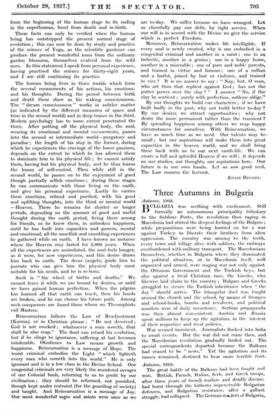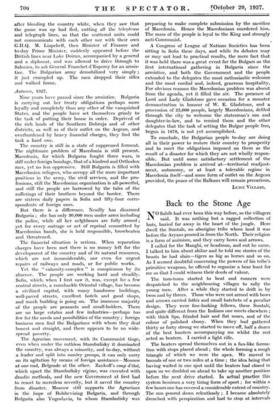Three Autumns in Bulgaria
Autumn, 1903. BULGARIA was seething with excitement. Still formally an autonomous principality tributary to the Sublime Porte, the revolution then raging in Macedonia had stirred the deepest feelings of the Bulgars ; while preparations were being hurried on for a war against Turkey to liberate their brothers from alien oppression. The country was arming to the teeth, every town and village alive with soldiers, the railways overburdened with military transport. The Macedonians themselves, whether in Bulgaria where they dominated the political situation, or in Macedonia itself, well organized and armed, were waging war not only against the Ottoman Government and the Turkish beys, but also against a rival Christian race, the Greeks, who likewise laid claim to the country ; Bulgars and Greeks struggled to secure the Turkish inheritance when " the day " should arrive. The triangular duel was fought around the church and the school, by means of liturgies and school-books, bombs and revolvers, and political murders were of daily occurrence. Serbian propaganda was then almost non-existent. Austria and Russia spent millions to keep up the agitation, in the interest of their respective and rival policies.
War seemed imminent. Journalists flocked into Sofia to await events. But the war did not come then, and the Macedonian revolution gradually fizzled out. The special correspondents departed because the Balkans had ceased to be " news." Yet the agitation and its causes remained, destined to bear more terrible fruit.
Autumn, 1918. The great battle of the Balkans had been fought and won. British, French, Italian, Serb, and Greek troops, after three years of trench warfare and deadly disease, had burst through the hitherto impenetrable Bulgarian defences, and Bulgarian resistance, after a gallant struggle, had collapsed. The German maters of Bulgaria, after bleeding the country white, when they saw that the game was up had fled, cutting all the telephone and telegraph lines, so that the scattered units could not communicate with each other nor with their own G.H.Q. M. Liapcheff, then Minister of Finance and to-day Prime Minister, suddenly appeared before the British lines near Lake Doiran, accompanied by a general and a diplomat, and was allowed to drive through to Salonica, to ask General Franchet d'Esperey for an armis- tice. The Bulgarian armydemobilized very simply ; it just crumpled up. The men dropped their rifles and walked home.
Autumn, 1927. Nine years have passed since the armistice. Bulgaria is carrying out her treaty obligations perhaps more loyally and completely than any other of the vanquished States, and the people have set themselves grimly to the task of putting their house in order. Deprived of the rich lands of the Southern Dobruja and of other districts, as well as of their outlet on the Aegean, and overburdened by heavy financial charges, they find the task a hard one. The country is still in a state of suppressed ferment. The nightmare problem of Macedonia is still present. Macedonia, for which Bulgaria fought three wars, is still under foreign bondage, that of a kindred and Orthodox race, yet no less oppressive. Still Bulgaria is filled with Macedonian refugees, who occupy all the more important positions in the army, the civil services, and the pro- fessions, still the Macedonian organization is all-powerful, and still the people are harrowed by the tales of the sufferings of their brothers beyond the border. There are sixteen daily papers in Sofia and fifty-four corre- spondents of foreign ones. But there is a difference. Neuilly has disarmed Bulgaria ; she has only 30,000 men under arms including the police, while all her neighbours are fully armed ; yet for every outrage or act of reprisal committed by Macedonian bands, she is held responsible, browbeaten and threatened. The financial situation is serious. When reparation charges have been met there is no money left for the development of the country and of its natural resources, which are not inconsiderable, nor even for urgent repairs of railways and roads, or for public works. Yet the " calamity-complex " is conspicuous by its absence. The people are working hard and steadily. Sofia, which, when I first saw it, was, except for a few central streets, a ramshackle Oriental village, has become a civilized capital, with many handsome buildings, well-paved streets, excellent hotels and good shops, and much building is going on. The immense majority of the people are peasants and small-holders. There are no large estates and few industries—perhaps too few for the needs and possibilities of the country ; foreign business men find the Bulgarians with whom they deal honest and straight, and there appears to be no wide- spread poverty. The Agrarian movement, with its Communist tinge, even when under the ruthless Stambulisky it dominated the country, was always a minority, and to-day, without a leader and split into sundry groups, it can only carry on its agitation by means of foreign assistance—Moscow at one end, Belgrade at the other. Zankoff's coup d'etat, which upset the Stambulisky regime, was executed with drastic methods, and the new Government at first had to resort to merciless severity, but it saved the country from disaster. Moscow still supports the Agrarians in the hope of Bolshevizing. Bulgaria, and through Bulgaria also Yugoslavia, to whom Stambulisky was preparing to make complete submission by the sacrifice of Macedonia. Hence the Macedonians murdered him. The mass of the people is loyal to the King and strongly anti-Communist. A Congress of League of Nations Societies has been sitting in Sofia these days, and while its debates may or may not lead to practical results, the mere fact that it was held there was a great event for the Bulgars as the first international gathering in Bulgaria since the armistice, and both the Government and the people extended to the delegates the most enthusiastic welcome and the most cordial and, indeed, generous hospitality. For obvious reasons the Macedonian problem was absent from the agenda, yet it filled the air. The presence of Lord and Lady Gladstone gave occasion for a monster demonstration in honour of W. E. Gladstone, and a procession of 25,000 people, largely Macedonians, defiled through the city to welcome the statesman's son and daughter-in-law, and to remind them and the other delegates that the task of setting the Bulgar people free, begun in 1878, is not yet accomplished. To conclude, the Bulgarian people to-day are doing all in their power to restore their country to prosperity and to meet the obligations imposed on them as the result of a disaster for which they are not wholly respon- sible. But until some satisfactory settlement of the Macedonian problem is arrived at—territorial readjust- ment, autonomy, or at least a tolerable regime in Macedonia itself—and some form of outlet on the Aegean provided, the peace of the Balkans will remain precarious.
LUIGI VILLARI.



























































 Previous page
Previous page